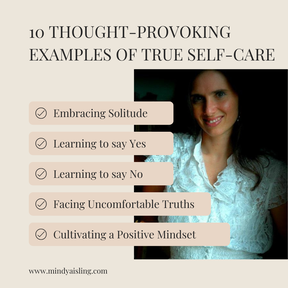|
Self-care is often portrayed through the lens of soothing activities like bubble baths, scented candles, or spa days. While these can be delightful ways to unwind, true self-care goes beyond the surface and involves intentional practices that nurture your mental health, even when they might seem challenging. Here are ten examples of self-care that require courage, honesty, and resilience.  Facing Fear through Expression: Self-care means speaking your mind, even when fear tries to silence you. Confronting your anxieties by expressing your thoughts and feelings can be a powerful act of self-love. Setting Boundaries: Learning to say no and establishing healthy boundaries is a form of self-care that protects your mental well-being. It involves prioritizing your needs and respecting your limits, even if it means disappointing others. Seeking Professional Help: Acknowledging the need for therapy or counseling is an important aspect of self-care. Taking that step to seek professional help demonstrates a commitment to your mental health and personal growth. Forgiving Yourself: Self-compassion is a challenging yet crucial form of self-care. Forgiving yourself for past mistakes and embracing imperfections allows you to move forward with a lighter heart and a clearer mind. Confronting Toxic Relationships: Letting go of toxic relationships, whether they be friendships or family ties, is a bold act of self-preservation. It may be difficult, but it creates space for healthier connections to flourish.  Embracing Solitude: Spending time alone, without distractions, can be a powerful form of self-reflection and self-discovery. Embracing solitude allows you to connect with your inner self and recharge your mental batteries. Learning to Say Yes: On the flip side, self-care involves stepping out of your comfort zone and saying yes to opportunities that align with your values and desires. It's about embracing growth and new experiences. Learning to Say No: Mastering the art of saying no is a fundamental form of self-care. Recognizing your limits and having the courage to decline commitments that overwhelm you is crucial for maintaining mental well-being. It involves prioritizing your needs and ensuring that your energy is directed toward what truly matters to you. Facing Uncomfortable Truths: Self-awareness is a cornerstone of self-care. Confronting uncomfortable truths about yourself, your actions, or your past can be challenging but is essential for personal growth and healing. Cultivating a Positive Mindset: Shifting towards a positive mindset requires conscious effort. Practicing gratitude, reframing negative thoughts, and focusing on the present moment contribute to a more optimistic and resilient mental state. While bubble baths and pampering sessions have their place, real self-care involves confronting the difficult aspects of life head-on. By incorporating these challenging practices into your routine, you foster a deeper, more resilient connection with yourself and enhance your overall mental health. First time FREE no-obligation session, click here!
0 Comments
Leave a Reply. |
AuthorMindy Amita AislingAuthenticity EmpowermentLife Coaching for Big-Hearted Overthinkers & Entreprenerds🐲Own Your Weird
🌎 Change Your World ⬇️ DIY Courses 👩🏻💻1:1 RemoteCoaching Fully Accredited ICF Certified Mindy Amita Aisling, is a professionally trained and board-certified leadership, authenticity, and entrepreneur coach.
Mindy exceeds all requirements set forth by the International Coaching Federation (ICF) for Master Coach certification. Mindy is also a licensed mediator, communications coach, and conflict resolution practicer. As a mediator, she has worked both in private practice and as a court appointment mediator at her local county courthouse. Through her innovative approach, she assists clients in examining their limiting beliefs, questioning their assumptions about how the world works, and releasing the notion that they are anything less than perfect. As a result, individuals who work with Mindy cultivate the ability to stand firm in their beliefs, live authentically and decisively, and discover an experience of life that is easy and graceful. In 2021, Mindy founded How to Be Human and Entreprenerd. These programs have enabled her to share her wisdom and knowledge with a broader audience in service of her vision of helping others live authentic lives This, in turn, has empowered more individuals to lead their most TRUE and COURAGEOUS lives. When she is not working, Mindy can be found playing outdoors in the beautiful Pacific Northwest, creating art, spending time with friends & family, or with her nose deep in a book. You can sign up for her newsletter here. Archives
June 2024
Categories
All
ICF Certified Life CoachAffordable Online Life Coaching |


 RSS Feed
RSS Feed
